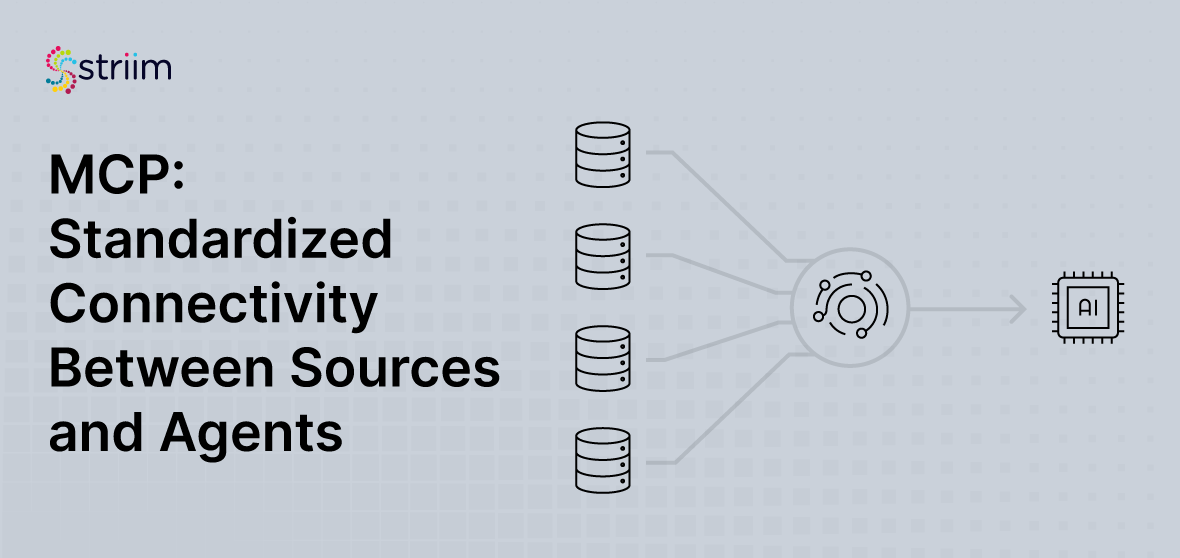It started with a tweet. In the afternoon of November 30, 2022, with just a few modest words, Sam Altman unleashed ChatGPT upon the world. Within hours, it was an internet sensation. Five days later, the platform reached 1 million users.
ChatGPT’s seminal moment wasn’t a singular case. Looking back, we know ChatGPT and its emergent rivals sparked the beginnings of the AI revolution. And today, it’s not just tech enthusiasts brimming with excitement for the promise of AI applications. It’s also enterprise leaders, bullish on the competitive advantages of leveraging real-time AI to better serve their customers, slash costs, and unlock new revenue opportunities.

But for AI to work for the modern enterprise, it can’t be isolated to a single LLM interface like ChatGPT, or a standalone application like Microsoft Copilot. It needs to be embedded, connected with the databases, tools, and systems that make AI’s outputs meaningful.
This is the promise of Agents enabled by Model Context Protocol (MCP). This article will explore how MCP’s technology, in tandem with real-time data contexts, can finally bring AI to enterprise operations.
The Evolution of AI: From LLMs to Autonomous Agents
In just a few short years, AI as we know it has dramatically evolved. While ChatGPT asserted itself as the LLM everyone knew and loved, other prominent AI interfaces joined the scene. Anthropic’s Claude, Google’s Bard (which later became Gemini), and another tool named Perplexity became our helpful desktop companions.
From the outset, conversational LLMs were both fun to use, and helpful for everyday tasks. But they weren’t considered sufficient for everyday work —not until late 2023 when their ability to handle complex tasks significantly improved.
Soon enough LLMs could generate not just text-based outputs, but images, videos, and even audio files. This led to an explosion of AI tools to assist writing, coding, and notetaking. Over time, AI evolved from simple task-takers to “agentic systems,” capable not only of answering instructions but acting autonomously, even using other tools themselves, to perform multi-step operations.
Fast forward to today, and many enterprises are still exploring how they can best leverage AI. Tools like conversational LLMs have proved extremely useful for ad-hoc tasks. Yet these tools are only so effective in isolation—siloed off from the data and contexts of the wider organization.
The next step: to embed AI tools in the enterprise by connecting them with the data, systems, and contexts they need to make an impact.
The Challenge of Connecting Agents to Systems and Tools
As agentic AI emerged, it became clear that context was critical to better outcomes. Yet connecting agents to relevant sources was difficult and time consuming, as developers struggled with a patchwork of custom-built integrations and hardcoded APIs.
For enterprises, building these interfaces between agents and databases has been slow and complex. Up to now, this has hindered their ability to test and iterate agentic systems across the business. Enterprises need a faster, more scalable way to connect sources and agents, without labor-intensive custom-coding for each application and database.
Enter Model Context Protocol (MCP), a new, standardized protocol enabling AI models to interface cleanly with external tools and data in a structured format.
Like the “USB-C” of AI, MCP offers a universal standard that makes it much faster and easier to connect agentic AI with tools and databases. Before MCP, bringing valuable context to agents at scale was insurmountable for enterprise companies. MCP promises to make this process fast and straightforward, finally enabling engineers to embed AI in the enterprise.
With MCP, developers can plug agents into a variety of tools and data sources, without having to individually code integrations or implement API calls. This is a gamechanger: not just for faster time-to-value when it comes to leveraging context-rich AI, but for building robust, agentic systems at scale.
In one test by Twilio, MCP sped up agentic performance by 20%, and increased task success rate from 92.3% to 100%. Another study found that MCP also reduced compute costs by up to 30%. The results are clear. MCP isn’t just an accelerator, but the new standard for enterprise AI.
A New Standard for Agentic Systems
Invented by Anthropic, MCP is an open standard for managing and transferring context between AI models, tools, applications, and agents. It enables AI systems to remember, share, and reuse information across tools and environments by exchanging structured context in a consistent way.
MCP lets agentic systems learn and use context in powerful ways. The context, however, is still critically important. The better your data—its speed, quality, governance, and enrichment—the better context you can send to intelligent systems through MCP.
Striim’s Value: Delivering Real-Time Data Context
From simple interfaces, to tools, agents, and now embedded in enterprise infrastructure—generative AI has come a long way in just a few years. Today, MCP represents a huge opportunity for enterprises, but it calls for a new mandate: the need for a real-time, well-governed, AI-ready data access for agents without compromising production workloads, data sensitivity, or compliance.
Directly exposing production operational data stores to agents is a recipe for performance and governance headaches. High-frequency queries from AI workloads can create unpredictable spikes in load, impacting mission-critical transactions and degrading end-user experiences. It also increases the risk of compliance violations and accidental data exposure.
The safer and smarter approach is to continuously replicate operational data into secure zones that are purpose built to serve agents via MCP servers. These zones preserve production performance, enforce access policies, and ensure AI systems are working with fresh, well-governed data while allowing controlled write-back when needed, without ever touching the live systems that run the business.
That’s where integrative solutions like Striim come in. Sitting at the heart of this new architecture, Striim’s MCP AgentLink offers a continuous, real-time, cleansed, and protected operational replica in safe, compliant zones—giving agents fresh, accurate data without exposing production systems. With a growing number of operational databases such as Oracle, Azure PostgreSQL, Databricks, and Snowflake announcing support for MCP, Striim ensures these systems can feed governed, AI-ready context directly into MCP servers in real time.
Specifically Striim:
- Replicates operational databases (e.g., Oracle, SQL Server, PostgreSQL, Salesforce) in real-time to read-only, agent-safe destinations, PostgreSQL clusters.
- Processes and transforms streaming data to remove PII, enriches it with context, and prepares it for agentic consumption.
- Routes agent-generated writes to a safe staging layer, validates them, and syncs them back to source systems through its stream processing engine.
- Powers event processing to deliver decision-ready, well-structured event data where it’s needed most.
Simply put, Striim is the real-time, intelligent, and compliant middleware that bridges enterprise systems and MCP agent workloads. With Striim MCP AgentLink, enterprises can finally realize the promise of AI by connecting it with their existing tools and databases.

With Striim MCP AgentLink, enterprises can deliver AI-ready data from anywhere—instantly and without disruption. We’re not just moving data in real time—we’re delivering real-time context, so AI systems can act with full awareness of the business.
ALOK PAREEK
EVP of Products & Engineering, Striim
Powerful Use Cases for MCP-Empowered AI
The real value of MCP lies in its ability to transform business use cases and unlock new revenue streams. Let’s consider some powerful use cases that MCP could unlock for modern enterprises.
Autonomous Patient Support
Imagine healthcare agents assisting patients and clinicians. They could shed light on available healthcare options by instantly retrieving medical records, insurance coverage, and treatment guidelines from multiple secure systems.
Agents could query EHRs, insurance portals, and clinical knowledge bases in real time through MCP, without exposing sensitive patient data.
Personalized Financial Advisory
Agentic AI could be an ideal analyst tool for investment consultants. Connected to the right systems, they could deliver tailored investment and financial planning recommendations using a client’s up-to-date financial profile and market data.
Through MCP, analyst agents could secure client portfolios, transaction history, and live market trends to generate compliant, personalized advice.
Supply Chain Optimization
In manufacturing, AI systems could reduce operational complexity while drastically improving efficiency in the supply chain. Imagine agents that could dynamically adjust procurement, manufacturing, and logistics to maintain efficiency and meet demand.
Supply chain agents could orchestrate planning decisions using live inventory, shipping schedules, and product demand forecasts, accessed securely through MCP.
Personalized, Real-Time Marketing
AI agents have the potential not just to ideate hyper-targeted marketing campaigns, but to deliver them in real time. Pulling from recent purchases, loyalty status, and in-stock SKUs, agentic systems could instantly push a custom promotion to high-value customers visiting a product website or visiting a store.
To make this happen, the agent would use MCP to retrieve live behavioral data, customer segmentation data, and product availability to generate and deliver tailored campaigns in seconds.
The Future of Agentic Systems with Striim and MCP
The arrival of MCP represents another major step in the evolution of AI technology. The building blocks for autonomous, intelligent systems are coming together. Now is the time to connect them.

“Our customers are moving fast to build real-time, decision-ready AI into their operations,” …“By embedding governance, compliance, and safety directly into the data streams, we give them the confidence to scale MCP-powered AI without slowing down innovation.”
ALI KUTAY
CEO and Co-Founder, Striim
With Striim MCP AgentLink, enterprises can finally realize the promise of agentic AI at scale. They can connect agents with context from any and all of their sources and databases. They can send trusted, well-governed, decision-ready data to intelligent systems. And they can do it all at the scale and speed enterprises demand: in sub-second latency, so agents can make instant impact.
Book a demo today to see how Striim’s MCP AgentLink can bring real-time, governed context to your AI systems.



.png)
